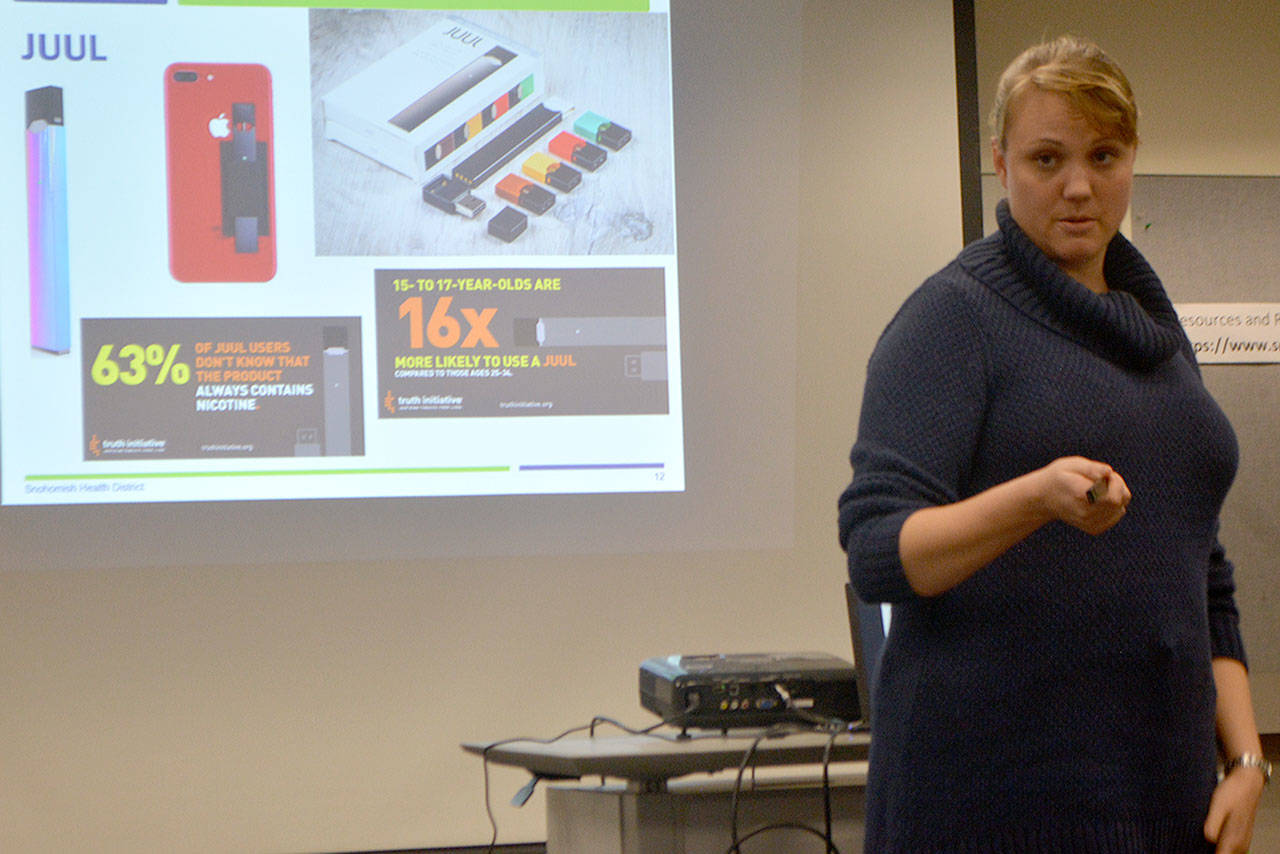First of 2 parts
MARYSVILLE – Juul can be hard to detect, but it is not a hidden jewel as far as county health officials are concerned.
“It’s small and easy to hide,” Jennifer Reid of the Snohomish Health District said at a recent seminar at the Marysville Library.
Vaping is all the rage as a healthy youth survey says Juuling has more than doubled countywide the past few years. Reid did not have exact numbers for Marysville or Arlington.
It’s been all over the news lately, with lung illnesses and even some deaths nationwide being attributed to vaping. Also, Gov. Jay Inslee instituted an emergency ban on the sales of flavored vaping, which is very popular among youth. The state Department of Health released an app to try to help youth stop vaping. In January, the age limit to buy vaping products will go up from 18 to 21. And the public health crisis is on the cover of this week’s Time magazine.
“It’s a scary topic,” Reid said.
She said the problems are happening because vaping products were approved before enough research was done to find out the short- and long-term effects.
“The quality control is still a little bit shaky,” she said.
Reid said many kids who wouldn’t think of smoking have tried Juul because of the flavors. “The flavors, we’re not sure what they do to the body,” she said.
Also, Juuling is more popular than e-cigarettes because, “It’s not as harsh on the throat.” Because it’s the size of a thumb drive, users “always have it on them. They take a couple puffs and put it down,” she said.
As a result, it’s easy to become addicted. Products can be bought with different nicotine concentrations.
“There’s massive amount of nicotine,” Reid said. “If you consume enough nicotine you will die.”
Nicotine affects all parts of the body, she added, especially the brain.
“It can damage the ability to make good decisions,” she said.
Reid said users can develop “vaper’s cough” and do damage to their DNA. The effects of long-term use and second-hand smoke from vaping are still being studied, too.
“We don’t know over the long term what it will do to you, such as cancer,” she said.
Reid didn’t talk much about vaping drugs, but of course some are doing that. She talked about some of the vaping products: Adults like e-cigs, which are disposable, and vape pens with rechargeable batteries and e-liquid. Along with Juul, younger people like MODs, which create massive clouds.
Reid called it an epidemic as students are vaping in hallways and bathrooms. She said some school districts are putting monitors in bathrooms and cameras right outside them to check for who might be vaping.
Reid said Marysville is doing some things to try to keep kids from starting. Marysville Together Coalition is teaching about it in Life Skills classes in middle school. It’s also taught in high school health classes.
“Prevention classes are the best thing to do,” she said, “from elementary all the way up to high school.”
Greg Kanehen of the coalition added that health classes need to rethink what they teach. And community partners need to be looked at to see how they can help.
He said more funding is finally going into testing vaping products.
While smoking cigarettes can kill you long-term, he said the vaping deaths have occurred over a few days, with the user slowly declining from acute pnemonia.
“If you do vape – don’t,” was his advice.
Kanehen said vaping was sold as a product that would help cigarette smokers quit. That’s what the Food and Drug Administration approved. But that’s not how many people are using them.
“It’s not helping. It just added a new method” to get people hooked on nicotine, Kanehen said.
People who have never used are now trying it.
“I don’t want them to ever try,” Kanehen said.
Chris Gutierrez works for the Marysville School District in the early learning center. She attended to she could pass the information along to the families she works with. They are all curious because vaping has been in the news so much lately. She said she had heard previously that vaping was supposed to be better than smoking. But she said it’s probably better not to “inhale stuff inside your lungs. I want to learn more about it.”
This seminar was the second of six being put on at the library about parenting. Gutierrez also attended the first one.
“It was about parents talking to teens. I was really good, too,” she said.
Part 2: Marysville and Arlington schools discuss how they are dealing with vaping.
Upcoming seminars
5:30 p.m. at 6120 Grove St.
Oct. 8: Help students feel safe in schools
Oct. 22: Parenting Do’s and Don’ts
Nov. 5: Legalized marijuana and prescription drug abuse
Nov. 19: Understanding and handling stress, anxiety and depression
Building relationships
with young people
Express care: Be dependable, listen, believe in me, be warm, encourage.
Challenge growth: Expect my best, stretch, reflect on failures, hold me accountable.
Provide support: Navigate, empower, advocate, set boundaries
Share power: Respect me, include me, collaborate, let me lead.
Expand possibilities: Broaden horizons, inspire, connect.



